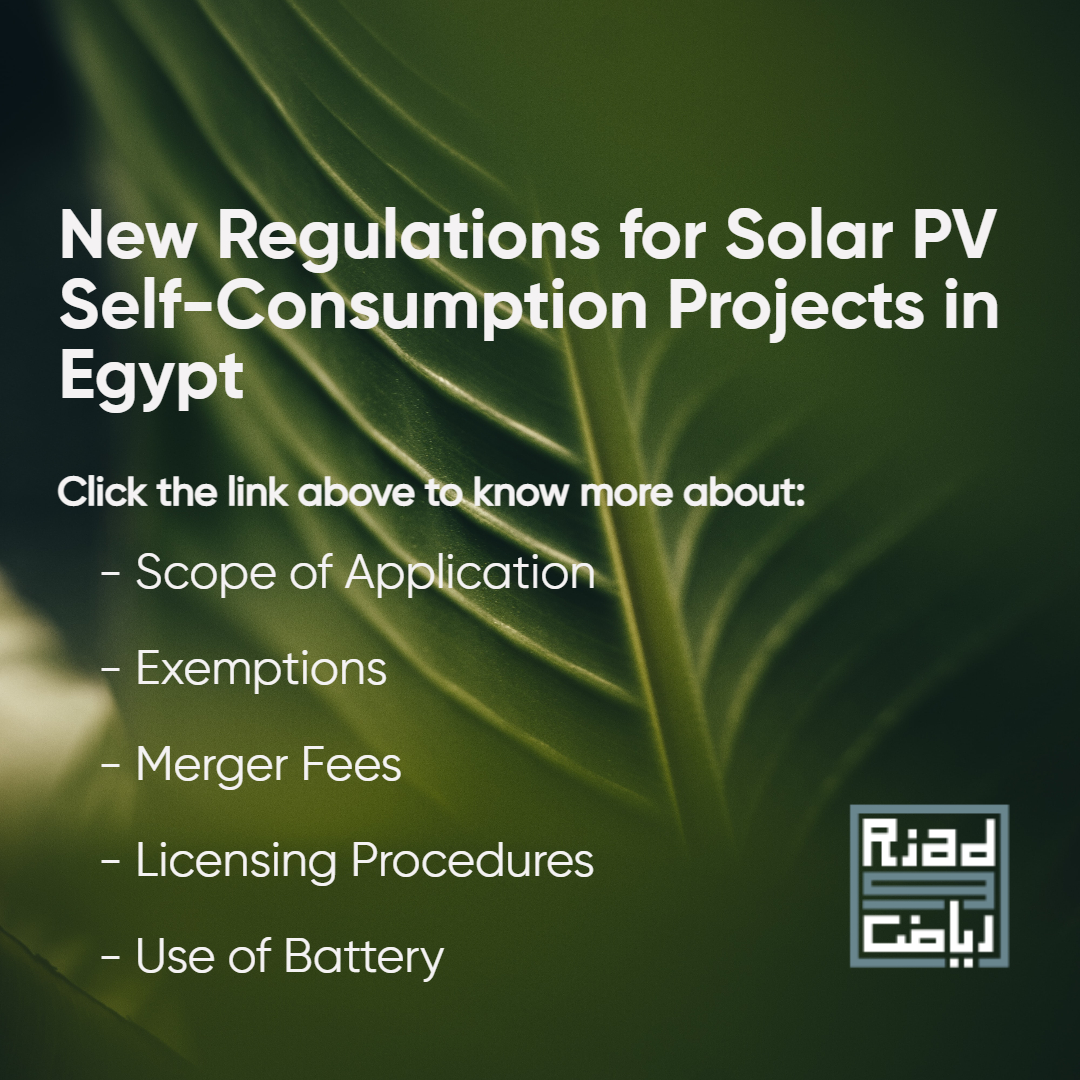
New Regulations for Solar PV Self-Consumption Projects – Egypt
The Egyptian Electric Utility & Consumer Protection Regulatory Agency (EgyptERA) issued Circular No. 3 for 2023 to regulate the licensing procedures and requirements for solar self-consumption plants (“Regulations”). The Regulations come into force on 1 March 2023.
The solar self-consumption system allows the use of the PV electricity generated on-site to meet the energy needs of the consumer but not to exchange the generated electricity with the grid.
Scope of Application
The Regulations will apply on self-consumption isolated and connected PV plant with generation capacity above 500 kW.
Projects with generation capacity of less than 500 kW can be exempted from the licensing requirements upon submitting a request to EgyptERA. However, a plant that is developed and owned by a qualified developer who enter into power purchase agreement with the consumer must be licensed.
Project Location
A self-consumption solar PV project must locate within the site of the consumer as reflected in its operation license.
Project Capacity
The capacity of the project might not exceed the maximum electricity consumption of the consumer throughout the year preceding the commercial operation date of the plant. In all cases, the maximum allowed generation capacity of the PV plant is 30MW.
The total generation capacity of the solar PV projects under the net-metering and self-consumption system all around Egypt will not exceed 1000 MW including the existing and the future projects.
Merger Fee
Merger fee will be paid according to the rates announced by EgyptERA.
However, existing and future self-consumption projects with capacity up to 10 MW will be exempted from paying the merger fee as of the effective date of the Regulations.
Licensing Requirements and Procedures
Isolated self-consumption projects
In order to establish an isolated self-consumption solar PV plant, the consumer, or the company which will develop the plant for the consumer (developer) shall be required to obtain the customary license for electricity generation.
Connected Self-consumption solar PV projects
In order to integrate the generated electricity with the electric power system, the consumer/develop shall obtain the prior approval of the network operator, being the Egyptian Electricity Transmission Company (EETC) or the licensed distribution company.
EgyptERA License
Projects with generation capacity exceeding 500 kW must obtain a prior license from EgyptERA before applying for the approval of the network operator.
Licensing Procedures
The licensing procedures for projects connected to the grid will include the following main steps:
- Determination of the allowed capacity: the consumer/developer will submit a request to the network operator to determine the capacity of the PV plant that can be integrated with the consumer’s electricity system. The network operator is committed to determine this matter within one week from submitting the request thereto.
- Selection of the developer: the consumer/developer will choose the company that will develop the solar plant from among the companies qualified by EgyptERA.
- Applying for the preliminary approval: The consumer/developer will apply to the network operator for a preliminary permit to establish the PV plant and pay the associated fees. The application will include,among others, the following information:
- Qualification certificate of the developing company.
- Copy of the ownership deed, lease or usufruct agreement of the land upon which the plant will be established. The lease or the usufruct agreement must be for a minimum duration of 25 years.
- Copy of the agreement signed between the consumer and the developing company.
- Copy of the tax card and the commercial register of the developing company.
- Copy of the last electricity bill of the consumer.
- Installation drawings of the PV panels approved by a licensed engineer.
- The technical specification of the plant with catalogues of its components.
- Testing certificates of the project components.
- Copy of the approval of the environmental assessment study.
- EgyptERA license for projects with generation capacity exceeding 500 kW.
- Establishing the plant: upon obtaining the preliminary approval, the consumer/developer is required to complete the establishment of the plant within six (6) month for plants with generation capacity up to 500 kW, or one (1) year for plants with generation capacity exceeding 500 kW.
- Inspection of the Plant: the consumer/developer will notify network operator of the completion of the plant and pay the associated inspection fees. The network operator will inspect the project to ensure that it complies with the regulatory rules and applicable codes, and will notify the consumer with any correction actions that need to be taken.
- Commercial Operation: Upon successful testing, meters will be installed, and commercial operation will start.
Battery Systems
Batteries are allowed to be used with the self-consumption system provided that the following requirements are fulfilled:
- The batteries must be integrated with the plant.
- The batteries will be used for the needs of the consumer to reduce any imbalances between the generation and the electricity system of the consumer.
- The capacity of the batteries will not exceed 20% of the generation capacity of the plant.
- In case of network disconnection, the entire electricity system must be isolated through appropriate circuit breakers equipped with voltage sensors.
- Installation of smoke detectors at the battery’s location.
- Compliance with the firefighting code IEC 62619.
- For batteries with capacity exceeding 100 kW/hour, the following safety system must be installed:
- Over Current Protection.
- Ground Fault Protection.
- Over Heat Protection.
- Automatic AC and DC Open Circuit when Fault Detection.
- Insulating Monitoring.
For further information about the Regulations, please feel free to contact Dr. Fatma Salah
